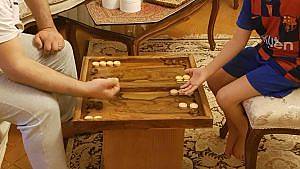According to many Iranians living abroad, the recent quarantine and lockdown conditions have provided a good opportunity for family units to be together - one of its interesting effects in this regard has been the full-time presence of parents with their children and their conversations conducted in their mother tongue.
They believe that their full-time presence at home and spending time with their children, speaking Persian, and reading stories and lullabies of their mother tongue is very effective for improving children’s understanding and progress in learning their mother language and that the positive effect of this short-term period is much greater than sending their children to Persian language classes over the long-term which they have done in the past.
Another diaspora experience relates to an Iranian resident of California who became very seriously unwell with COVID-19 and was placed on a ventilator. Before he was put into a coma, his family located in Iran and the US held a communal prayer session with him over social media, thus enacting a traditional religious and social ritual of support and comfort for him.
Whether or not any part of his subsequent recovery is due to this, it demonstrates the huge importance of such rituals in extreme times, and the non-religious customary aspect of this practice should not be ignored either.
Traditional indoor riddles and board games
Like other nations throughout the world, Iranian communities are famous for their indoor riddles and board games.
These games have been developed throughout the history of the aforementioned communities as tools to spend long nights, harsh winter conditions, and periods of difficult conditions, and times of reunions of families. Some of these games even enjoy highly regarded stances among ICH elements identifying Iranians. A prominent example is takhteh nard (backgammon) which is found in virtually any Iranian household.
Sanandaj, Kurdistan, among a couple of other cities are famous for their high quality, traditionally designed and crafted boards of the game. Among the other indoor riddle games, the riddles of the younger generations, the oral riddles of elders for the family members, and the like are worth mentioning.
These games continue to be practised during the COVID-19 pandemic as tools of strengthening family and community links. Families have creatively started playing some of these games online, with the help of social media.
Family members and elders over distances continue to create similar happy experiences in cyberspace.
For more details and for images of the element, see website
The designations employed and the presentation in the texts and documents referenced in this platform do not imply the expression of any opinion whatsoever on the part of UNESCO concerning the legal status of any country, territory, city or area or of its authorities or concerning the delimitation of its frontiers or boundaries.
